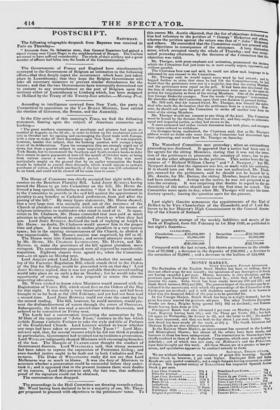The House of Commons was chiefly occupied last night with
a dis- cussion on the Benefices Plurality Bill. Lord JOHN RUSSELL having moved the House to go into Committee on the bill, Mr. HUME de- livered a long speech, introducing a motion " that it be an instruction to the Committee to provide in the said bill against the appointment in plurality to any benefice or Cathedral preferment, from and after the passing of the bill." By many figure statements, Mr. Hume showed, that a very large sum was annually paid out of the revenues of the Church to pluralists and sinecurists, which would afford the means of religious instruction to multitudes who stood in need of it; In oppo- sition to Dr. Chalmers, Mr. Hume contended that men paid as much attention to religion without an established church as when they had one. Lord JOHN RUSSELL declined the task of replying at length to Mr. Hume : no doubt, Dr. Chalmers would answer him in the proper time and place. It was intended to confine pluralism in a very narrow space; but in the existing circumstances of the Church, to abolish it was impracticable. Mr. Hurne's motion was negatived, by 107 to 37.
The House went into Committee ; and several attempts were made by Mr.. HUMS, Mr. CHARLES LUSHINGTON, Mr. HAWF.S, and Mr. Rieeosr, to make the provisions of the bill against pluralism more stringent. The amendments proposed were all rejected by considerable majorities. Eighteen clauses were agreed to; when the Committee rose—to sit again on Monday next.
Lord ASHLEY asked Lord John Russell, whether the second read. ing of the Factories Regulation Bill, which stands third in the Orders of the Day for Monday, would be proceeded with on that day ? Lord JOHN RUSSELL replied, that it was not probable that the second reading would take place on so early a day as Monday ; but he would take the opportunity of stating, that it was proposed to retain the clauses respecting education.
Mr. WYNN wished to know when Ministers would proceed with the Registration of Voters Bill, which stood first on the Orders of the Day for that night. It was really a very important measure ; and had been brought in so far back as the 19th February, and yet had riot been read a second time. Lord JOHN RUSSELL could not state the exact day for the second reading. The bill, however, he could mention, would pre- vent the disfranchisement of voters through the errors of Overseers. Subsequently, the bill was read a second time without discussion, and ordered to be committed on Friday next.
The Lords had a conversation respecting the assumption by Dr. NV Hale of the signature of "John Tuam," contrary to the law which forbids Roman Catholic Prelates to take the style and title of Prelates of the Established Church. Lord LORTON wished to know whether any steps had been taken to prosecute " John Tuam ?" Lord MEL- BOURNE said, that, for several reasons which he did not think it prudent to particularize, Government had resolved not to institute a prosecution. Lord WICKLOW indignantly charged Ministers with encouraging breaches of the law. The Marquis of CLANRICARDE thought the conduct of Government discreet. Lord Wractimsea. said, that strong measures had been taken to repress the expression of Protestant feeling; and even-banded justice ought to be dealt out to both Catholics and Pro- testants. The Duke of WELLINGTON really did not see that Lord Melbourne was so much to blame. It was the duty of Ministers to ascertain whether a prosecution could be successful before they under- took it ; and it appeared that in the present instance there were doubts of its success. Lord MELBOURNE said, the fact was, that sufficient proof of the signature could not be obtained.
The conversation then dropped.


























 Previous page
Previous page